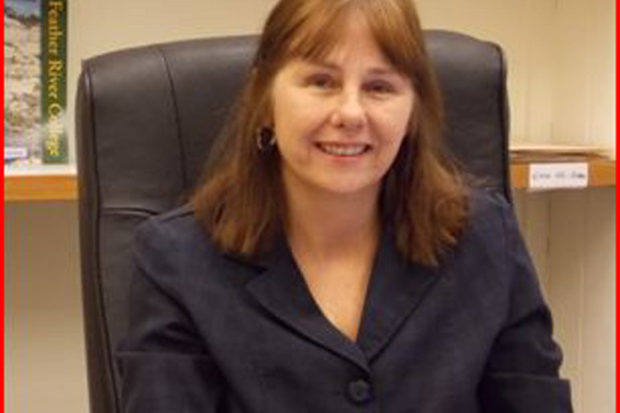

By Boston Woodard
Six years ago, the faculty and staff at Feather River College (FRC) in Quincy, Calif., made what they were sure would be a historic decision. Professor Joan Parkin said the fateful decision was “to open its doors to the incarcerated for the first time in the college’s history.”
The FRC Incarcerated Student Program (ISP) is the newest rehabilitative program permitted to provide educational opportunities to qualified San Quentin students.
Parkin, who holds a Ph.D. and is director of the program, and Kelly Conner, an instructional assistant with ISP, recently spent time speaking with San Quentin prisoners, taking applications for a course in French language and eventually enrolling around 50 prisoners. This was the FRC’s second visit to San Quentin this year.
Since 2007, the FRC has been offering correspondence-only courses to prisoners. The California Correctional Center at Susanville, the Central California Women’s Facility, Pelican Bay in Crescent City, the California Men’s Colony in San Luis Obispo and now San Quentin provide FRC onsite classes for the incarcerated.
The FRC’s interest in San Quentin came about because of prisoner Michael Calvin Holmes, who was enrolled in the college program while at the California Men’s Colony (CMC). At the CMC, Holmes took pre-algebra, arts appreciation, English and psychology, and is now able to take a class in beginning French at San Quentin.
“As a continuing student, I am confident that my participation in Feather River College will assure my success,” said Holmes. “I feel FRC has given me a new start and a solid foundation as well.”

According to Parkin, the FRC offers “a general education set of courses, occupation and technical programs and associate degree.” Their program is set up to give the opportunity to receive certificates to a diverse prisoner population.
San Quentin educator Tom Bolema said, “A growing demand for college programming among resident students is timely, as SQ’s GED literacy coordinator is effecting many graduations. The arrival of FRC at San Quentin is at an opportune time for students.”
“We are funded the same way every community college is, by the Board of Governors, as it applies to all California residents including prisoners,” said Parkin. The cost of all college books issued to students is absorbed by the FRC because most students cannot afford them.
“We need more funding for what we aim to do, which is to bring an associate’s degree program to any inmate who wants one,” said Parkin. The FRC would like to provide a reentry structured program upon a student’s release.
San Quentin educator J. Kaufman commented, “A major portion of California’s budgetary pie is spent on the CDCR [California Department of Corrections and Rehabilitation] (incarcerating prisoners). All the preeminent prison research studies show that educating inmates reduces recidivism.” Many prison educators say that funds can be reallocated to other areas of need by spending less taxpayer dollars on incarceration.
Professor Parkin said one goal of the FRC is to provide programs that “will enhance personal development and rehabilitation through an effective learning process that helps students to attain their goals.” This helps to increase the students’ “self-worth and confidence,” explained Parkin.
FRC instructional assistant Conner said it would take ISP students six semesters to complete an associate degree and “will advance their educational growth.”
When asked what it means to be part of the FRC’s beginning French course, prisoner Orlando Harris said, “For me, it means I have an opportunity to be part of San Quentin’s Voluntary Education Program (VEP), which allows me to pursue my educational goals.”
The ISP’s vision entails a multifaceted set of offers such as short-term certificate programs to maintain the college-level quality and rigor expected of students, provide quality education to a diverse group of prisoners of various backgrounds, ages and genders, and expanded employment opportunities.

Maintaining high expectations for “success, educational preparedness, and student achievement with the goal of reducing recidivism rates” is high on the FRC agenda.
“Everyone benefits from this opportunity,” said instructional assistant Conner. “We are thrilled to be part of this important opportunity for you men at San Quentin and hope to expand our curriculum here.”
San Quentin literacy coordinator Karen Williams, who helped facilitate the FRC’s visit around the prison, said, “FRC offers correspondence courses designed for even ‘condemned row’ prisoners to receive an AA degree. As such, every San Quentin prisoner has the opportunity to be successful in getting a quality education.”
Among the many educational institutions that offer programs to San Quentin are Coastline College, Patten College, Lassen Community College, Ohio University and Blackstone College. The FRC is coordinating with these other programs to provide even more opportunities.
“We are all at San Quentin to assist in educating—this is not a competition,” said Parkin. The FRC is unique in the sense that it “provides education with a human touch…designed to accommodate as many students as possible.”
The FRC facilitators say that public skepticism abounds when it comes to educating the incarcerated, but the FRC’s supporters understand that this is a result of “over three decades of more retributive than rehabilitative policies governed by tough-on-crime legislators.”
The FRC’s catalogue elucidates the importance of education behind bars, which benefits both the prisoner and society. Former CDCR Secretary James E. Tilton in the FRC catalog said he values an educated prison populace. Tilton argued, “Post-secondary education programs provide prisoners with opportunities and tools required for successful re-entry into society.”
This reinforcement reduces recidivism and provides “enormous fiscal and public safety benefits.” In other words, “an ex-felon who is educated, is a much better neighbor than one who is not,” according to research from the FRC.
San Quentin prisoner and FRC applicant Julian Glenn Padgett said, “This is a special time to further my education and invest time in learning. I’m excited about being a part of Feather River College and what they promote.”
 Padgett said that those who participate in opportunities such as those provided by the FRC “have the advantage of equal opportunities once we are released from incarceration.”
Padgett said that those who participate in opportunities such as those provided by the FRC “have the advantage of equal opportunities once we are released from incarceration.”
Skeptics insist that spending money to educate prisoners is wasted money. “Spending $51,000 per year to keep an uneducated, unskilled individual in prison just doesn’t make any sense,” said Conner. “This is a perfect opportunity to prepare someone to make it in society after release from prison.”
“Educating inmates has a positive ripple effect throughout society; it improves the quality of life for all citizens,” said Kaufman.
Literacy Coordinator Tom Bolema said that there is strong evidence that these programs not only provide the tools to students to succeed in the classroom but also lower recidivism.
Parkin said they have seen “complete transformations.” Some men and women could “barely write” when they enrolled in the program and then learned beyond expectations.
“There is much excitement here, especially for the Volunteer Education Program coordinators, to have more access for students to higher education,” said Bolema, “This is good for residents, good for custody [staff], and good for the prison culture.”
“A lot of what we do has to do with how receptive each prison’s administration is toward education as a rehabilitative tool,” said Conner. “San Quentin seems to be a place where prisoners can enjoy an atmosphere where everyone seems to get along for the most part.”
The FRC recently held its third commencement ceremony at Valley State Prison for Women in Chowchilla, graduating 35 students, some with associate degrees, according to Parkin.
The high-security Pelican Bay State Prison in Crescent City recently had its first graduation. One student graduate was housed in that prison’s Security Housing Unit (SHU), a first at that institution. The SHU graduate, who took courses by correspondence, was escorted in shackles to a designated area in the prison and issued his diploma by FRC staff.
Both FRC representatives, Parkin and Conner, had a powerful influence on both students and San Quentin staff.
“It was a very noticeable impact on the overall atmosphere of San Quentin’s Education Department, creating a mood of excitement and energy about pursuing subjects not offered at other San Quentin–based colleges,” said Williams.
“I feel privileged to be part of the FRC program,” said student Joe Shelton. “There is no doubt that the education I’m receiving via FRC courses is going to make the difference for the better I’ve been striving for since my incarceration.”
For more on Feather River College, visit www.frc.edu.
*****
Boston Woodard is a prisoner/journalist who writes for the Community Alliance, the San Quentin News and the Soledad Star and has edited The Communicator. Boston is the author of Inside the Broken California Prison System, which is available at Amazon. Learn more at www.brokencaliforniaprison.com.
